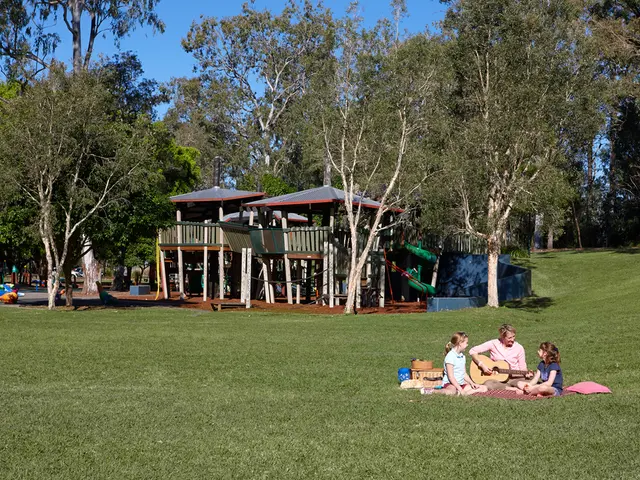Economic Transformation: Focusing on Comprehensive Indicators Beyond Gross Domestic Product (GDP)
Advancing Civilizations and Economic Progress: The Shift Towards Sustainable Prosperity Metrics
As the global community explores revolutionary energy and resource systems, the measure of economic success becomes increasingly critical. Traditional indicators, such as Gross Domestic Product (GDP), narrowly focus on output and growth, often overlooking broader societal and environmental impacts. The concept of a Well-being Economy, a transformative model, aims to address this discrepancy by prioritizing holistic human and environmental well-being over mere financial expansion[1][3][4].
Understanding the Well-being Economy
The Well-being Economy differs from traditional models by considering the quality of life as the primary measure of success rather than quantifying the production of goods and services. It takes into account a comprehensive range of factors, including health, education, equity, mental well-being, environmental quality, and community resilience, elements largely absent from GDP calculations[4]. Confederating social, environmental, and economic factors offers a more nuanced perspective on prosperity[4].
Such economic frameworks, like Scotland's Wellbeing Economy Monitor and New Zealand's Living Standards Framework Dashboard, use pragmatic tools to track progress and guide policy and budget decisions towards improving overall well-being[2][4].
Motivation for a New Approach
Critics of GDP argue that it fails to account for negative activities, such as pollution and resource depletion, while overlooking factors that truly enrich life, such as family relationships, community engagement, and personal well-being[4]. The shift towards a Well-being Economy ensures that sustainable development and equitable distribution of resources are prioritized alongside economic growth[3][4].
This approach further aids in balancing short-term economic development with long-term environmental health, ensuring that today's progress does not come at the expense of future generations' well-being[3].
Implementing a Well-being Economy
Transitioning to such a model requires concerted efforts, including:
- Developing Integrative Metrics: Combining quantitative indicators, such as health and education statistics, with subjective measures, such as life satisfaction and happiness surveys, to create a multi-dimensional picture of well-being[2][5].
- Embedding Well-being into Policy: Policy decisions should be informed by well-being data to promote both short-term and long-term social and environmental outcomes[7].
- Cultural and Institutional Change: Encouraging a shift in societal mindsets to value well-being over economic growth requires public engagement, education, and leadership commitment[7].
- Ensuring Equality: Policymakers should work towards ensuring that improvements in well-being reach all populations, especially the most vulnerable and marginalized[6].
- Integrating Environmental Health: The importance of natural ecosystems for human well-being must be recognized, necessitating the incorporation of environmental indicators into economic assessments[1][6].
Potential Challenges
Implementing a Well-being Economy faces several obstacles, such as overcoming entrenched economic interests, data collection complexities, and balancing diverse stakeholder priorities. Nevertheless, international momentum for change, including initiatives from Iceland to Scotland, serves as a testament to the viability of sustainable progress models[7].
In conclusion, the shift to a Well-being Economy offers a holistic approach to measuring and achieving economic success, encompassing not only financial growth but also human well-being and environmental health. By redefining prosperity, societies can cultivate resilient, equitable, and sustainable futures, ensuring that economic activity serves the well-being of current and future generations[2][5].
References:[1] WeAll, What is a Wellbeing Economy[2] WeAll, Measuring the Wellbeing Economy (2024)[3] OECD, The Economy of Well-being (2023)[4] Improvement Service, Wellbeing Economy Briefing (2023)[5] Tutor2u, What is Economic Wellbeing? (2023)[6] Public Health Wales, Circular Economies and Sustainable Health and Well-being (2022)[7] Government of Iceland, What is a Well-being Economy? (2024)
- The evolution of economic systems necessitates a paradigm shift towards focusing on science and data-driven strategies, such as data-and-cloud-computing, to build integrative metrics and effectively measure the Well-being Economy.
- In the realm of health-and-wellness, mental health is recognized as a crucial factor in a comprehensive model of well-being, calling for investing in mental health programs and services.
- The Well-being Economy encompasses personal-finance and business aspects, urging policymakers to prioritize financial literacy education, skills-training, and sustainable investing practices to secure a prosperous future.
- The concept of sustainable living plays a pivotal role in the Well-being Economy, as it emphasizes cooking with healthy ingredients and adopting environmentally friendly practices in home-and-garden management.
- Champions of the Well-being Economy work tirelessly to break the barriers imposed by traditional finance and development models, striving for financing options that support green ventures and eco-friendly technology innovations.
- Advocates for a Well-being Economy are not just found in the realm of environmental-science and climate-change activism, but also in the business sector, with corporate leaders investing in clean energy and carbon-neutral initiatives.
- In the pursuit of sustainable prosperity, championing education-and-self-development practices becomes vital for fostering a well-rounded understanding of personal-growth, career-development, and society's collective responsibility towards long-term environmental health.
- A Well-being Economy places emphasis on collaboration and the incorporation of various disciplines, bringing together perspectives from fields like fitness-and-exercise, environmental-science, and technology to create informed, progressive policies.
- The Well-being Economy is more than just a transformation of economic metrics; it represents a new lifestyle, one that places value on healthy-cooking, staying active, and fostering strong community connections.
- In the face of climate-change and resource depletion, the Well-being Economy serves as a beacon of hope, reminding us that recognition and action towards environmental and human well-being are not mere niceties, but essential components of a sustainable and prosperous future.
- The implementation of the Well-being Economy marks an exciting intersection of science, policy, and cultural change, offering a beacon of hope for civilizations seeking prosperity without compromising our planet or the well-being of future generations.







